Lords of the Earth
CAMPAIGN TWENTY-FOUR
Turn 69
1341
~ 1345 Anno Domini
703 ~ 707 in the year of the Hegira
New for T59
Paths to victory:
There are several options open to a player when an NPN has been defeated
- Take
the victory conditions (see NPN rules) available for NPNs and allow the
NPN to go its own way. This is a useful option if you do not want to
increase your imperial size or bother with the NPNs internal affairs.
- Keep
it as either Pacified or Pacified Tributary. You will not get victory
conditions but will get income from the NPNs Homeland/Friendly regions and
cities. Also, as the years from conquest marker goes up it may turn
Friendly or Tributary. Using this option treats the NPN as a super-region.
- Old
school, you will have to take the regions you want and conquer each in
turn. If the capital is taken then some of the NPNs ratings will be added
to yours if higher. The NPN will cease to exist.
Dealing with hordes:
Hordes can be dealt with a number of ways rather than just an outright battle.
These are
- Threaten
them. Hordes respond to a show of strength and may leave you alone if
confronted with enough force.
- Bribe
them. They are looking for gold and lands to settle or pillage so if you
offer them it on a plate they may well go away. They may also just take it
and attack anyway.
- Use
diplomacy. It does work and I suggest chucking in a royal princess or two.
You can also use a combination of the above. If the horde
becomes a FA or A, you can direct its attacks or its path of migration.
New for T57
Non-player rules update: I’ve updated the NPN rules to fit
better with the Lord’s system. Please check them out.
New for T56
New movement and action rules: I know that they didn’t meet with
overall approval last time around but I will be implementing the proposed
movement/action rules for T57 (see here). Any current player that
takes them up will be given a 2 turn bonus to their credits but they can
continue to use the current method for the time being. All new players will
have to use them. I’d rather stick to the standard rules but there is no way
Lords is sustainable as a long-term game (and I want 24 to be long-term) unless
there is some simplification for the GM.
The areas that cause me
the most processing grief are movement, AP calculation and garrison changes.
New for T53
Restrictions on Royal Marriages: Due to the complications arising
from these rules only K, H or P leaders can benefit from a Royal Marriage. Members
of the Royal Family that have not come into play are not considered eligible.
Also, Primate, Order and Secret Empire positions are not eligible for marriage
bonuses. These are meant to be diplomatic arrangements between sovereign
states.
New for T52
East – West Split: I’m going to try to split the
East and the West parts of the game so that I can process the orders quicker –
don’t know if or how it will work yet but lets see if it’ll happen
New for T51
No Orders: If I don’t get any orders in for a position and the
player doesn’t answer my emails then I’ll put the position back to a NPN and
put aside the players cash (if any) until they pick it or another nation up
again.
New for T50
Request Royal Marriage: Used to ask a NPN nation for a bride for one of
your Princes or a suitor for one of your little Princesses. Cost is 6AP,
Charisma based. The leader doesn’t have to be in the NPNs capital but if he
isn’t then he needs to be in your homeland/capital.
New for T49
Naval Reaction and Blockade: Naval Reactions can only occur
when there is action in a Sea Zone that the fleet is based at. The fleet has to
be based from a port and not the Sea Zone. Also, the Reaction can only occur
when your own lands or those of an ally benefiting from a Defensive Pact
marriage bonus are attacked. It also applies to any merchant fleets you operate
through the Sea Zone in the case of piracy.
Naval Blockade’s only work if your fleet is based in the same Sea Zone
as the target port and you spend all (every single one) of your APs in the
blockade. The fleet must be based from a port and not a Sea Zone.
New for T48
The use of fleets for Reaction and mitigating the effects
of Pirates: My
understanding has now changed since we GMs have had some discussion on the
list. The use of Reaction has been explained on the Wiki and Patrol is no
longer used in the Base Rules.
Reaction
Trade Route Escorts
- This
is specific to Lords 24. Units can be assigned to a trade route to act as
static convoy escort using the G type leader. Note this is not as good as
patrol as the warships assigned will only reduce the effects of piracy,
not capture or destroy the pirates themselves.
Updated NPN and Primacy rules:
Yep, been tinkering again but I feel a almost serene sense of satisfaction with
my latest offering. See what you think.
Added the ability to hire
mercenary captain when there is no mercenary company available: See the mercenary tables
New for T47
Improved cultivation at TL5: If a nation has reached the
dizzy heights of TL5 than it can benefit from improved cultivation. You can
Improve a cultivated homeland region from 2GPv to 3GPv, or any other controlled
cultivated region from 1GPv to 2GPv. This is a level one megalithic
construction.
New for T46
NPNS: I’ve tweaked the NPN and Primacy/Order rules a little to make them
fit better with the 24 game. I’ve also reduced their overall RRV to make
diplomacy easier.
Second Positions in the East: As I’ve not got a lot of players
in the East, I would be willing to allow a second position from existing
players. Let me know if you’re interested.
New for T45
New Rivers: I’ve added in some new possible rivers onto the map.
These are rivers that were once passable by light traffic (remember Cogs cannot
travel on rivers) and have now become silted up. You can dredge a stretch of
the river (along one region border edge) as a 0.5 level project.
Gripes:
Agro as conversion –
this has restrictions (see 2.11.5.3) which I will be enforcing from now on.
Rivers can only support
light ships – as far as I know Cogs cannot travel on rivers. This also includes
Cogs built for trade.
New Primates: We have two new Primate positions this turn. Jumal
Skyfather, which is an Estonian god and the Coptic Church based out of Axum.
New for T44
Minor islands and City States: I’ll be allowing minor islands (Corfu, Jerba, Wight etc) and city states to be used as
locations from T44. Just let me know the rationale behind why you want it
separate and if reasonable I’ll add it in. Once they are created as locations,
they obey all the rules of islands etc. However, their Gpv cannot go above 0.
Flooding: The last few turns have seen a massive increase in the
amount of flooding that has occurred. It appears that the years are getting
warmer and wetter. As a result of this some of the minor rivers on the map are
once again becoming passable to river traffic.
Denmark:
Following on from the Minor Islands stuff, you can see that Denmark is now separated out to Jutland and
Syaland (Zeeland).
Announcements and
items of note
General Stuff: Please use my Paypal account (stephenbrunt@yahoo.co.uk) for all
Lords’ 24 payments. If you cannot use this facility then please let me know and
I will see what I can do about filtering US funds to my account. I may also
stop using the throneworld email address due to the mass of spam I’m getting!
Order Form: Please use the standard excel
order form from now on. I’ll update the site with a link to it next week when I
get some time. This is important as it helps me process the turn more quickly.
THIS IS NOW MANDATORY.
Non-Payment: some of you still owe me some
cash. Although it may come as surprise that this is not my main source of
income, I see it only polite that you pay for the occasionally night out. So,
if you’re under zero next turn I’ll not process you orders.
Version 6: Lords 24 uses version 6 of the
basic rules
The Map: The map now includes India as well as Europe, Central Asia and Africa. I’ve greyed out repeated areas on the maps to
make my life easier. However, this means some player nations are split across
more than one map. I may increase the size of the main map but I’ll have to
think on this.
Tithes and Tribute: I think these are automatically
updated by the stats program, so no need to declare them in your orders.
Control
of the Papacy and Religious Orders: In Lords 24 we will not always have a player Pope (or
Caliph etc for that matter) and the following rules are used to determine which
player faction controls the Pope’s actions, Papacy
Rules. I’ve also added some stuff about gaining support from their armies
How to make your GM
happy (PLEASE READ! REALLY!):
Please send any and all Lords24
correspondence to lords24gm@ymail.com
or stephenbrunt@yahoo.co.uk .
LORDS 24 WEB RESOURCES
The Lords Twenty-Four homepage is
at:
http://lords.throneworld.com/lote24/index.html
All of the on-line resources, including
order forms, mailing lists and web-sites for Lords of the Earth are summarized
on this page:
http://lords.throneworld.com/?page_id=2
You can subscribe to the Lords 24 mailing
list by pointing your web-browser at:
http://games.groups.yahoo.com/group/lote24
…and following the instructions on that
page.
VARIOUS FEES AND LEVIES
At the moment the turns cost $5 – please
pay up of you owe
We are using the latest v6.3.5 of the
basic rule book that can be found here
http://lords.throneworld.com/players/loterule/rules.html
Western Europe

Heiliges Romisches Reich
(Roman Catholic Civilized Open Empire)
Leopold, Holy Roman Emperor-Elect
|

|
The German King was content to see how the Magyar
situation unfolded although his subjects complained bitterly at his court as
their lands were raided by the horsemen. Old Gustave the Grim was to pass
away in 1344.
..
|
Norman Kingdom
of France
(Roman Catholic Civilized Open Empire)
Louis, King of France
|

|
The
death of King Louis early in 1341 saw Prince Philippe claim that he should be
king. Thibault argued that Louis’s son and heir should be made king and
Philippe’s rightful place was to at the head of the army, protecting the
realm from the Moor and heathen tribes. Initially, Philippe was persuaded to
accept the boy-king but his ambition festered throughout these years and in
1345 his betrayal was complete as he killed Thibault during a council. Rather
than head straight for Paris, Philipe took
control of the army in Gascony and claimed
the lands of Poitou, Limousin,
Aquitaine and Languedoc as his own. Brittany
and the isolated city of Lyon
rebelled from the boy-king.
|
The Principality of Salerno
(Roman Catholic Civilised Open Empire)
Ricardo V Durazzo, Prince of Salerno
|

|
Vast sums of gold
were shipped east to Constantinople to help shore up the beleaguered Roman Empire. The Via Canalis was extended out of Venice and on into the
newly gained Carinthian territories. Prince Carlo Martello had no time for
the Lithuanian nobles of Vincencia and so simply had Prince Roberto replace
them with loyal Italian supported of House Durazzo. It was through Giovanni
Boccaccio’s efforts, supported by the Podesta of Napoli, that the city
finally returned to Salernese rule. Prince Carlo himself had established that
the Magyar threat needed to be curtailed and gathering men from Pescara, Ravenna and Venice marched on Slovenia. The Magyars had left
only a few horsemen to quell any local unrest and could do little to stop the
Duke’s army of nearly eight thousand men. Unfortunately, the Magyars were
after a greater prize and had relentlessly raided the rich territory of Verona
before the Duke’s arrival. The Catholic horde took vast sums of gold and
grain from the province but respectively left the Papal holding alone.
|
.
The Grand Order of St Denis
(Roman Catholic Civilized Religious
Order)
Lothaire, Grandmaster of the Grand Order of St Denis
|
|
Order
sites were built throughout France
with Robert overseeing an Estate in Anjou.
His attempts to raise the Preceptory to an Oratory in Vermandois met with
failure as valuable resources were stolen during its construction. A great
citadel, the Chastel Tomar, was built from the ruins of the city of Burgos and the city
itself settled with loyal brothers and their families. New Burgos would be at the forefront at the
fight against Islam, although the Papal envoys to Lothaire called for some
more direct action against the Moor. Lothaire himself moved back to the Ile
de France to oversee his Order. He was also to instruct that the Chastel
Blanc fortress be built just outside the walls of Aragon. Langston of England was
approached by the English to claim his right to their throne but the brother
had grown strong in the faith and turned down the Saxons. He was to dedicate
himself to the protection of Christianity from Calania with the Order’s
fleet. Gascon found himself embroiled in a typical Sardinian feud as he was
accused of insulting the Olbian king’s daughter. The situation quickly
escalated into outright hostility against Gascon and the Order as the brother
was dragged before the Olbian king in chains. Despite the Pope’s plea for
clemency, Gascon was executed by being hurled from the cliffs in late 1343
and the Order told to leave the islands. The Moslem Order of Maliki Madhhab
attempted a punishing raid into Valencia but the region’s
garrison proved more than a match for their five thousand.
|
The Knights of Malta
(Roman Catholic Civilized Religious Order
Stephan, Grandmaster of the Knights of Malta
|
|
The Maltese fleet
flee back to their island after Umar’s successor retakes Cyprus from
the Knights. Captain Hans of Alessia was to perish in 1345 a broken man
|
The Magyar Nation
The Magyars raided deep into German territory as the ranged unopposed throughout
Bavaria, Thuringia and Meissen. Verona was also raided by the horsemen as the
Salernese were occupied elsewhere.
The Duchy of Liguria
Duke Hector looked far and wide for lands to conquer but found his forces
inadequate. So as his army continued to grow in size, he sent diplomats to the
Akramid rebels in Mihkael to gain a foothold in North
Africa.
Western and South Africa

The Mwene-Mutapa
Empire
(African Unkulkulun Civilised Open
Empire)
Ikko Addi, Emperor of Mapungubwe
|

|
As
the city of Qimbara
grew in size, tries loyal to Ikko Addi moved north to settle the Zimbabwean
wilderness. A steady influx of tribesmen from the south also started to sway
the balance of power in the conquered lands of Gorongo. The great trail was
extended from Kafue up and into Zimbabwe to aid the new colonists
as they travelled to those lands. Ikko Addi was blessed with a daughter as he
continued to oversee his Empire. It was left to Gabbo to persuade the
Phalaborwa to increase their support for the Empire with a formal alliance.
|
Usama-Yoruba Onium of Ibo
(African Pagan Civilised Open Empire)
Ildayi, Emperor of the Ibo
|
|
The walls of Ibo
were built high and wide to prevent attack from any invaders into the African
kingdom. Ildayi poured men and resources into clearing the jungle and
wilderness from Bomi, Marampa, Susu, Kouanke and Boure but still his advisors
said that they were struggling to cope with the Empire’s sheer size. Luckily,
Ildayi’s forebears had spent heavily in the apparatus of government and the
clerks and officials were finally put to good use. He spent time away from
the affairs of state to marry from the Iboan nobility and was blessed with a
young daughter. Despite his undeniable skill in diplomacy, Kinta the Voice
was unable to gain more support from the Kanem-Bornu king. He was assisted by
old Zuril until his death in 1342 from a fever
|
North Africa and Moslem Spain

The Empire of Egypt
(Sunni Islam Civilized Open Empire)
Badr al-Mahmud, Sultan of Egypt
|

|
Badr oversaw the
expansion of most of Egypt’s
great cities as Akasha, Memphis, Alexandria, Al’Qairah
and El’Uqsor all gre in size. New cities were founded in the lands of the
Alwa and Kassala and the old ruins of Axum
resettled with loyal Egyptians. To ensure that he gathered the greatest
amount of tax from his subjects, Badr ordered a nationwide census of the
Egyptian peoples. He commanded that envoys be sent to the Aswani to dissuade them
from attacking the Egyptian lands. Vast sums of gold were sent along with the
promise of marriage to the Sultan himself. The Aswani raided deep into
Adulis, carrying off what gold and loot they could find. The Syrian offshoot
of the Egyptian dynasty continued to cement its control over Petra.
|
The Akramid Caliphate
(Sunni Islam Civilized Open Empire)
Onika, Caliph of the Akramids
|

|
Overcrowding,
coupled with poor sanitation in the Andalusian barracks saw disease break out
amongst the men stationed there. To add further misery on the shoulders of
Ummi the outbreak could not be contained as many of the soldiers had families
living in the towns and Seville
itself. The Caliph himself succumbed
to the fever along with many members of his direct family and the young
princes Tiroman and Tomas. Unrest followed swiftly at the heels of the
disease and the provinces Galacia and Salamanca
rebelled from the Caliphate. Prince Quinn clashed with Prince Onika over the
crown and his quick victory settled the remaining provinces. The Pope was alarmed
as over one in three Sardinians were converted to Islam by the Caliphate’s
mullahs. Brides were gathered from Kabilya and Talavera for the Caliph.
Originally destined for Ummi’s bedchambers, the young brides were eventually
married to Prince Quinn after he had taken the Caliphate as his own. The
marriages secured by Mikmuk and Saharav saw relations with the two break away
provinces restored. Quinn was blessed with a young son by the Talaveran
princess but she sadly died giving birth to the child. The Caliph was
outraged when news of the Ligurians claim on Mikhael reached his court as the
opportunist Italians had sent envoys to the city while the Caliphate
recovered from these troubled times. Badar was tasked to explore the seas
from the Canaries but simply disappeared, never to be seen again. The
Sicilians attempt to raid the Kabilyan coast met with stiff resistance as the
defenders routed the Duke’s forces; sinking many of his ships in the battle.
|
Arabia and the Middle East

The Buwayid Sultanate
(Sunni Islam Civilized Open Empire)
Najib, Sultan of the Buwayids
|

|
Thirty
thousand cavalry were recruited in Mesopotamia
to help deter the Cuman from heading south. Najib had sent men north under
the command of Ahmed Saber in an attempt to destroy the Cossacks winter feed
but the fertile lands provided ample food for the tribesmen and little harm
was done. His agents were still active throughout the Black Sea and the Eastern Mediterranean as he sought to increase the
Sultanate’s knowledge; fearful of falling behind the Christians in modern
sciences. In Media, the massive fortress of Tappeh Dokhtar, of the Virgin’s
Mound, was built to protect the eastern frontier and throughout the Sultanate
lesser forts were raised for defence. With Prince Khalim defending the east,
Mazen was dispatched to Isauria to take command of the garrison there and to
watch the Sultan’s western lands. Anshu took a long procession throughout the
Buwayid lands, collecting forgotten garrisons from the Sultanate’s provinces.
He ended these years in Quetta
where he gained some small support from the city’s dignitaries. Ammar had
managed to smooth over some of the hostility felt by the Selucids after the
Sultanate’s attack years earlier. Najib was also to extend the dredging of
the Euphrates around Selucia to provide easier access to the Red Sea.
.
|
Glorious Khwarzim
(Sunni Islam Civilized Open Empire)
Abu I-Ghazi Bahadur, Khan of the Khwarzim
|

|
Abu
oversaw the extension of the great roads throughout the Khwarimi lands as
Gurgan and Tabaristan were linked to his capital. To help with their famine,
some grain was shipped to Abu’s eastern neighbours in Ilig. Both the Emir
Mofat and Muhammad Bin Musa were to gain more men to protect the northern
frontiers. Bin Musa, also called the Falcon of the Sands, was hailed as Abu’s
greatest general and entrusted with the Golden Scimitar. He was called upon
to throw back the encroaching Ademids when they attempted to raid into Azerbaijan.
The Falcon thwarted the raiders with the help of the Azeri Emir and forced
them back across the border, empty handed. Dadarshi was tasked with
persuading the Azeri’s to commit to the Empire but failed to make much inroads
even until his death in 1344. The Alan were converted to Islam as Abu’s
clerics preached to the horsemen. Abu himself ended these years in mourning
after his wife died in childbirth, two sons born earlier had perished of a
fever before the death of his wife.
.
|
The Ogaden Tribes
The Ogaden raided into Djibouti
but were repulsed by the Chalbi Emirate who harried the attackers from their lands. The Ogaden were
more successful with their raids on Sennar.
The Ademids
The Ademid raids into Pontus
provided the Sultan with a small amount of gold. His attempts to raid Georgia were
ultimately unsuccessful as the Khwarzimi pushed them back with great losses.
Scandia and the Out Isles

Jarldom of Orkeneyjar
(Roman Catholic Seafaring Open Empire)
Aegir Nicholson, Jarl of Orkney
|

|
The damage caused
by the fierce storms of previous years was cleared away and repaired in the
Hebrides, Strathclyde, Orkneys and the Highlands.
The mighty citadel in Thingvellir saw its walls built high and strong.
Dunaldur Erikson proclaimed that his nephew Gustav Aegirson would be his heir
and that his brother Hans would accompany him to court. A wise decision given
Dunaldur’s unexpected death of a sudden fever in 1344. None of the turmoil
that usually accompanied the Jarl’s death occurred and the transition of
power to Gustav happened smoothly. Before his death, Dunaldur discovered that
support of the Norwegian pirates was strong amongst the poor fisher-folk and
those that worked the sea. He had successfully ordered the construction of a
Preceptory for the Le Marteau in the Highlands but Houses for the order were
not completed in Stockholm
and Thingvellir. The old Svear province
of Halland became
friendly as the wars of the past were forgotten. Prince Frey Jotunson seemed
to be at peace with being passed over as Dunaldur’s heir and travelled to Stockholm to oversee the
Jarldom’s alliance with the Svear. Before his death in 1342, Rolf had
assisted the Jarl in improving the Orkneymen’s influence with the Le Marteau.
|
Saxon Kingdom
of England
(Roman Catholic Civilized Open Empire)
William, King of England
|

|
In Navarre, a new city called Giovanna sprung up around
the fortress of the same name. To protect its citizens, William ordered a
small curtain wall build around the growing city. More English gold was spent
cultivating the Asturian wilderness as William continued to improve the
English claim to the northern Spanish territories. The road down to Old
Castille was improved to allow the English allies, the Order of St Denis,
easy access to their sites. Lord Stross finally brought the independent
minded Wessexman fully into the Kingdom though his efforts with the Lord
Kentworth. Bishop Hamilton had survived an attempt by Moslem fanatics to kill
him as he supervised the Asturian defences but succumbed to a fever in 1343
nonetheless. To add to the English woes, King William died whilst hunting
shortly after his wife had also perished while in childbirth. With no issue
there were fears of unrest throughout the Kingdom but the English were in no
mood for rebellion as years of prosperity had fuelled their contentment. With
Langston unwilling to renounce his vows, a new King was found from amongst
the Sussex
nobility and he became the first of a new Saxon dynasty. Enlgand was to
suffer most from the depravations of the Norwegian pirates in the North Sea. The Rashidun Kaliph was implicated in
attempts on the Asturian governors life, although little came of it as the
would be assassins were caught before they could do any damage.
|
The Svear
Karina
attempted to improve the Svear’s finances by establishing trade through Perth to the French city of Cherbourg. Even the Svear merchants could not
reach the far lands of the Akramids from their new harbours in Perth. Attempts to revive
the old passion for the Church backfired as talk of the Old Gods and the way of
the Viking were revived throughout the Svear lands. Karina nurtured her young
son to rule after her a prayed that she could steer her resurgent kingdom
through the perils ahead until that time.
Eastern Europe
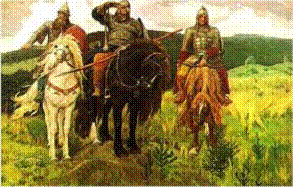
The Varangian Rus of Kiev
(Orthodox Civilized Open Empire)
Anastasia, Queen of the Rus
|

|
The
two beautiful daughters of Queen Anastasia, Tatiana and Ursula join her at
court but it was not long before the unfortunate Tatiana was pledged to the
Cuman Khan. Anastasia thought she had little choice but to curry favour with
the horde and sent the princess along with vast sums of gold east into Cuman
territory. Andreyev was supported by the Vladimir Order and managed to gain
some influence with the Khan. Unfortunately, the tribute came too late for
Suzdal and Seversk as the Cuman began to raid Kiev’s frontier provinces. With his
personal guard augmented by a further seven thousand cavalry, Prince Peter
was content to spend these years supporting his mother. He was blessed with
three young children by his wife Elizabeth.
|
The Grand Duchy of Poland
(Roman Catholic Civilised Open Empire)
Boleslaw Poznan, Grand Duke of Poland
|

|
While his father
remained a prisoner of the hated Bulgars, his young son Prince Casimir was
appointed to the Polish court. It was always Boleslaw’s intention that the
young prince succeed him. Vast sums of gold were sent to Kiev to keep the Cossacks at pay. Casimir
oversaw the gradual rebuilding of the Polish army as four thousand horse were
raised in Warsaw.
Elsewhere, Boleslaw’s generals continued to ensure his lands remained safe
from Bulgar raids. Jozef Fiszer spent his last years assisting the young
prince before his unfortunate death in 1341
|
The Kingdom of Hungary
(Eastern Orthodox Civilised Open Empire)
Ladislaus Hunyadi, King of Hungary
|

|
These were quiet
times on the Hungarian plains
|
The Kingdom of Estonia
(Jumali Skyfather Civilised Open Empire)
Konrad II, King of the Ests
|
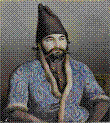
|
In response to the
threatening gestures and words emanating from the Hammer of God in
Helsingsfors, Konrad invested heavily in providing walls for his cities and
increasing the size of his personal guard. His rule from Estonia saw his nation remain at
peace during these years and he was blessed with a grand-daughter by Victor
and his Kymian wife Loni. Prince Hendrick successfully gained the full
support of Musa while Prince Juri supported Victor in patrolling the northern
frontier. Tooni of the Jumali was tasked with increasing their reach
throughout the nation but was tragically killed early in 1341. Some
compensation was gained when missionaries of the Sky-Father successfully
converted the heathens of Kalinin
to the Jumali faith. It was during these years that the Hammer made their
presence felt as they gained a claim on the Turku lands.
|
The Oriental Roman
Empire
(Roman Catholic Civilised Open Empire)
Andronicus II, Emperor of East Rome
|
|
The
Roman fleet in Constantinople was augmented
by twenty new Caravels under the command of Alexios. The admiral then patrolled
the seas of Constantinople with the
Byzantine fleet. Andronicus ruled from his palaces, assisted by the Prince
Constantine, lately returned empty handed from the German port of Cannes.
While Michael managed to garner more support from the walled port of Sevastopol,
Simon was commanded to improve relations with the city of Corfu. The Ademids had overrun the defences
at Pontus
but had not managed to capture the province. Elsewhere, the Western Uighurs felt
confident enough to regain the Bosnian provinces during these years.
|
The Cuman Cossacks
The feared Cossacks gained the support of the Kazans before punishing the Rus for their
delay in paying the tribute demanded. Suzdal and Seversk were pillaged by the Cossacks
before they took their payment.
Central Asia

Ilig
(Sunni Islam Civilized Open Empire)
Sulam, Khan of the Ilig
|
|
Sulam Beshwa so
desired to build a port on the Kyzl-Kum port that he sent resources to those
lands to build one. Unfortunately, they were turned back the Scythians and
prevented from reaching the Aral Sea. Sulam
continued to rule from Samarkand,
pleased that the grain from the Buwayids had prevented further riots over
food shortages. Colonists did settle in Kush
and Kuldja but found the lands of the Khvor too harsh to support new farms.
Missionaries from the Karakhanate were active amongst the Scythians who
proved willing converts to the word of Allah. Some success was also achieved
in the Shi’ite Kush in converting them to the true path. Prince Alabar spent
these years searching the land of the Kara-Khitai for any sign of the
Thalatha or other bandits. Although rumours abounded of their presence, the
peasants remained tight-lipped and Alabar was unable to locate any of their
hold-outs. He did discover that raiders from Avar had passed through the
Kara-Khitai only weeks before but their trail had run cold. Prince Harum Al-Harum was tasked with a
diplomatic mission amongst the tribesmen to the north-east. Amused by Harum’s
promises of great wealth and influence if they joined with the Karakhanate,
the tribesmen did little else than offer bread and salt to Harum’s entourage.
Word’s could not be eaten, ridden or used to destroy their enemies so meant
little to these men of the Steppe. The tribes of Western
Jungaria did promise to stop sending men to the Chuguchak as
their khan was one of the few to see merit in Harum’s words. Iman Ashahi led
a force south with Prince Bughra and Alli the Great to Baluchistan.
Although the Saffarids were willing to listen to the Iman, possible due to
the Karakhanate’s escort of over twenty thousand men, little could be
achieved whilst they were dominated by the Rajputi. On the road to Carmania,
the Iman fell ill and died from a fever. Command of the Ilig forces fell to
the Prince who had been hiding a smouldering resentment at not being put in
charge of the mission. He had persuaded Alli to join his conspiracy and the
two generals quickly took command of the army and declared their independence
from Sulam. While Sulam was preoccupied with gaining the support of the
tribes, raiders from Avar swept through the lands of Singanakh, Otrarsh and
Kuldja. Although Singanakh proved too well protected, the raiders were able
to plunder the other provinces. The Scythian khan again protested that these
were not his men but outlaws and bandits that had settled in his lands.
Kuldja was hit again by the Tzin-Kiang Zao and so damaging were their raids
that the newly colonised province was left virtually unpopulated. To add
further misery on the Karakhanate, the Memar tribes looted the border lands
of Ferghana and Kush.
|
India

Pratihara Kingdom of Kaunaj
(Hindu Civilised Open Empire)
Guram, Raja of Kaunaj
|
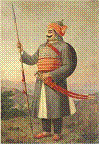
|
Guram spent the
vast resources at his command in founding a Primacy for the Hindu Faith. The
Prajnanam Brahma was to be based in Benares which became a the Holy City
of the Hindus. These years also saw Sahis fully embrace the Hindu faith as it
turned away from Islam. Edrosia had already converted in previous years.
Guram had also spent cash on raising Samaaj Order Houses in Ujjayani and
Setikami; work that was carried out by Indejit and his Dagger Master. The
great cities of Kaunaj and Calcutta
grew in size again and their massive walls dismantled and rebuilt to
encompass the new citizens. Prince Suresh was tasked with the annexation of
the Und Kingdom along with General Kam. Twenty
thousand recruits were added to Suresh’s force in Kaunaj, with nearly a third
being recruited from the noble elite. Although the Und forces put up a
spirited defence in Sukkur, twice routing the forces of General Kam, sheer
numbers took their toll and Kam eventually captured the province. With the
main Und force destroyed, Prince Suresh was able to roll over the remaining
defenders pathetic resistance and capture Und’s remaining provinces and
cities. While Prince Rajeesh was left in to rule the kingdom, Prince Anesh
continued to oversee events in the Palas of Bengal. Loaded with gold and
gifts from Guram’s treasury, Luresh was tasked with improving relations with
the province of
Jihjhoti.
|
Samaaj Kekataar
The Order’s forces
continue their expansion of Hinduism by the sword as they set Bauluch in
flames.
The Palas of Bengal
As a staunch
supporter of the Kaunaj regime, Gurdip willing poured substantial resources
into the founding of the Prajnanam Brahma, especially its clerical infrastructure.
Samaaj Houses were to be raised in the North-East territories but success was
only achieved in Bhutan.
Nevertheless, Gurdip’s sway with the Samaaj continued to improve. Despite his
nation’s part in the creation of the new Primacy, Gurdip’s missionaries had
little impact on the old Wheel territories of Tibet, Tz’uk’an and Om’Chu. He was
also disappointed that his agents were unable to pierce the defences of the
Guardians of Anuradhapura in Sri
Lanka. To smooth over relations with the
Bhutanese, Janni and Haram were to offer a series of marriage ties with the
province’s nobility. Wives were found for Gurdip as well as the Princes Rajeev
and Thon. In addition, several of the minor members of Gurdip’s household were
married off to the Bhutanese.
South East Asia and the Islands
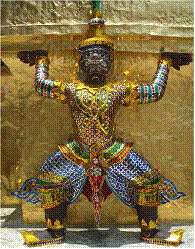
The Kambujadesa
Empire
(Hindu Civilised Open Empire)
Thao Pen-Pen, Emperor of the Khmer
|
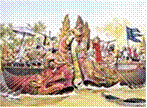
|
After a few years
of indolence, Thao Pen-Pen decided to once again meddle with the affairs of state.
He declared that Hom “Little Thao” Pen-Pen be his heir at the expense of the
more wayward Sovann. The city of Sambor
Prei Kuk grew in size and prosperity during these
years. Thao’s generosity stretched to Bakheng and Banjarmasin as the king granted the cities
gold from his treasury. Whilst Haimkong and Jaya Vong were tasked with the
defence of the realm, it was left to Cho Tae to assist Thao with the
kingdom’s affairs.
|
The Dai Kingdom
of Annam
(Buddhist Seafaring Open Empire)
Bhadramonte, King of Annam
|
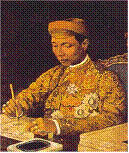
|
Mison was
protected by a mighty citadel and the city of Dai Viet by an improved wall. As part of
the negotiations with Thaton, the province
of Nampung and the city of Chai-Mai were ceded to Moulmein
in exchange for Korat and Kunming.
The lands of Laos
were to benefit from new irrigation and farms as Bhadramonte opened his
treasury to the peasants. The king was ruling from Annam
and was pleased that a new trade route to Nanchao and the holy city of Tai’Li was now possible.
His attempts to build temples in Tonkin and Annam came to nothing though as
the laity were still dubious about the power of the Great Wheel.
|
The Kingdom of Thaton
(Buddhist Civilised Open Empire)
Sajja, King of Thaton
|
|
Sajja, king of Thaton,
declared that his son Prince Vidura would be the first Grandmaster of the
“Burning Lotus”. The new Lotus Order was established in 1341 in Moulmein and Vidura
swore that the fledgling force would do everything to protect Thaton from any
Samaaj attack. Prince Kaeo continued his work as Sajja’s representative in
Tai’Li until his death of consumption in 1343. The Prince was popular in the
vassal capital and his funeral took many days to complete. General Chao Khun
Sa was tasked with defending Sajja’s lands
from Samatata but fell from his horse while hunting in the winter of 1341 and
died shortly afterwards. After the province
of Korat had been ceded to the
Annamese, Krom-Luang had moved a substantial Thatonese force to Nampung to
receive the province from Tonkin. He
remained there until his death in 1343. Sajja had instigated a temple
building programme for the Greater Wheel but was only successful in building
a small temple in Samatata. The king was relieved that he had started to
build aqueducts in Moulmein
and Thon Buri as news of the plague in the Song lands reached his court. His
only hope would was that they would be finished before the pestilence reached
his lands. To support his vassal, much gold was shipped to Tai’Li.
|
The Greater Wheel
(Buddhist Civilised Religious Primate)
The Most Blessed and Omniscient Longchenpa, the Rinpoche Master of the
Nyingma Order
|
|
The
Most Blessed and Omniscient Longchenpa, the Rinpoche Master of the Nyingma
Order, journeyed on foot high into the mountains of Guizhou, where he prayed for the
unenlightened at the great monastery there.
In his message to the geolong, he taught "Every action arising
from desire, aversion and ignorance produces suffering; every action arising from
the absence of desire, aversion and ignorance produces happiness." Then, contrary to the council many of the
Blessed in his Order who were concerned about his advanced age, Longchenpa
travelled west from Guizhou to Padishan in
the land of Thaton
to bless the new abbey at the former temple of Surmang
in the western part of the province. Sadly, such great exertions proved his
undoing and Longchempa passed into the Buddha’s light during the spring of
1344. Sonam Gyaltsen, the Venerable Trizin of the Sakya Order, busied himself
with expanding the temples in provinces surrounding Nan Chao before
journeying deep into the northeast to consecrate the Abbey of Shalu on the
banks of the Yangtze River in Szechwan
province.
|
The God-Empire of Sri
Vijaya
(Buddhist Civilised Open Empire)
Singhassari, God-Emperor of Sri Vijaya
|
|
Although
it was Singhassari’s desire to improve the farms and lands of the Sri Vijaya,
he was dismayed to learn that the techniques required to gain more yield out
of the lands were still unknown to his people. At least Timor
was cleared of palms and scrub and farms laid out for the peasants. A further
fifth of the peasants of Palembang
were converted to the true faith. Taking a wife from amongst the local
nobility of Sirivjaya, Singhassari was blessed with a young son. Lord Gautama
collected the fleet from Singaraja before setting off for Sirivjaya to patrol
the seas of the empire.
|
The Kingdom of Nanchao
Pa
Long was blessed with a young son by his wife Jing Shin. Sadly, she was to die
whilst giving birth to another child. Pa Long continued to rebuild his kingdom
by improving the towns and villages of Nanchao province. He was grateful of the
aid sent from Moulmein
by King Sajja.
Manchu’ko and Nihon

The Minamoto Shogunate
(Shinto Civilised Open Empire)
Kojiro Yasumori, Shogun of the East
|
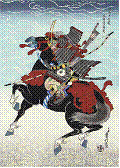
|
Shogun Kojiro
continued to expand the Minamoto fleet as he commissioned Ataka Bunes
throughout the Shogunate’s shipyards. The Ataka Bunes were later collected by
Prince Katsu and Turaka and joined with the fleet out of Shimonoseki. From Yamaguchi, he watched the restless
Taira to ensure the uneasy peace continued. His son Harao was left to rule
the Shogunate from the imperial estates at Heian. Missionaries were dispatched
to quell any Buddhist revival but saw little or no progress in converting the
masses from the old faith. Ryuu set lout from Yamaguchi to explore a route to
the island of Okinawa and although he was only
supplied with a single ship, the captain managed to bring back charts to the
island. In far Nan Patol, it was the task of Kuroda to persuade the islanders
to join with the Shogunate but the wily general had other intentions and
after gaining the hand of the Chief’s daughter, declared that he would remain
on the islands and distanced himself from the Shogunate.
|
The Goryeo Kingdom
(Buddhist Civilised Open Empire)
Wang Eun, King of Goryeo
|

|
One
of Wang Yong’s last acts before his death in 1345 was to conduct a new census
of the loyal Goryeon peoples. He had previously pulled most of the merchant
shipping out of Po Chi as he tried to regain some of the trade lost by the
rebellion and then moved onto Anshan
where he took control of the garrisons there. Wang Eun was commanded to
regain the province
of Mantap and Po Yang
city with his force of four thousand horse. A dour and silent man, the prince
was still respected for his military ability and his ruthlessness. The
breakaway province was undefended by the rebels and offered little resistance
to Wang as he easily took control of both city and the surrounding lands.
General Shin had command of the Goryeon elite force of five thousand cavalry
and pushed north from Bandao into the rebel heartlands of Liao-Tung. Although
the hated Wen Jiabao was cut down by Shin’s men, the rebels defence proved
too strong for the southerners and Shin was forced to flee back to Bandao
with the tattered remnants of his once great force. Yi Seong-Gye was able to
attracted less than one thousand mercenaries to his banner in Koguryo but
even such a small force was a welcome sight to the defeated Shin.
|
The Land under Heaven

The Kingdom of Koueichou
(Buddhist Civilised Open Empire)
Lo Sung, King of Koueichou
|
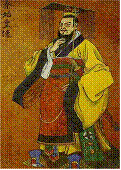
|
The death of Kai
Sung in the Spring of 1341 saw his son take control of the kingdom. Prince Lo
Sung was travelling back from Hunan
when the news of his father’s death reached him, after a long period of
mourning the new king took up the reins of statehood with his new wife at his
side. He was also blessed with a young daughter during these years. Princess
Rai Sung was married to the Chengshi prince, a trade deal sealed as part of
marriage agreement. In Hunan, Prince Lai Sung was assisted by Wo Sung and Han
Rou as he attempted to gain support amongst the defeated Cha’Ang’Sha. Cho Mai
was also to lend his support to the diplomatic efforts in Hunan before his death in 1343. Hsun Lee
was successful in hiring just fewer than fifteen hundred mercenary cavalry in
Szechwan before his death in 1345.
|
The Empire of the
Western Song
(Buddhist Civilised Open Empire)
Zhi Kuo, Emperor of the Western Song
|
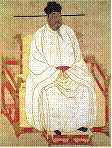
|
Zhi Kuo was
content to relax on his estates and rule his mighty kingdom whilst his
trusted generals kept watch on any Mongol threat. Late in 1345 disturbing
news came from Yun that what started as a minor localised epidemic had spread
throughout the kingdom. The effects were devastating and Zhi Kuo worst fears
were confirmed when his healers provided proof it was a highly virulent
strain of the plague. Over the course of just a few months, nearly one-third
of the Song population had perished including some of Zhi Kuo’s direct
family.
|
The Kingdom of Chengshi
(Buddhist Civilised Open Empire)
Xiang Sung, King of Chengshi
|
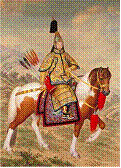
|
Over two thousand
men of the Chengshi army were disbanded and given work creating the roads
from Quwo to Suzhou and onto the Kwangtung
border with Annam.
To augment his fleet, Xiang Sung commissioned fourteen CMW’s in the Chengshi
dockyards for Admiral Shou. Xiang also took a wife from Koueichou to seal an
intricate trade agreement between the two nations. His new wife was called
Rai Sung and was some distant relation to the king. Chung took a force of ten
warships and set sail to explore the seas from Chengshi. He managed to gain
rutters for the Penunjuk Wan and the Riouw Sea
before returning to port.
|
The Kingdom of Chiang’Ning
(Buddhist Civilised Open Empire)
Song Wei, King of Chiang’Ning
|
|
The city of Tang-Chou grew in size
again and it massive walls rebuilt against any possible attack. The cities of
Zhengzhou and Jinan also saw a jump in population and the
Kingdom’s roads were extended out to link them into Chiang’Ning. The old
Yen’Ching elite in Tsianan were replaced by loyal supporters of Song Wei as
the province relinquished its ties with the northern kingdom. Song Wei
himself spent these years meddling with the affairs of the kingdom’s
merchants. As the years passed his health deteriorated rapidly and he was
forced to rule from his royal bedchamber.
The Zenzun kingdom saw some efforts by Song Wei to gain their support
and consequently Song was granted some recognition of his imperial claim.
|
North America
The Huron Confederacy
(Open Empire)
Dooyentate, Chief of the Huron
|

|
Dooyentate ruled
from Ossossane and tried, in vain, to install some idea of the amount of work
required to be Chief of the Hurons to his young son Tunka. Dooyentate also
laid claims to the largely unexplored lands of Tobacco and Wyandot as Lenape
setup outposts on their coasts.
|
The Anasazi
(Open Empire)
Kewa, Chief of the Anasazi
|

|
One of Ohkay’s
last acts as chief of the Anasazi was to name his son Kewa as his heir. The
young prince quickly took control of the tribes and declared himself Chief in
the newly walled city of Naco.
Ohkay had been in negotiations with the Navajo and had promised the hand of
Oningweh in marriage to their Chief. Kewa honoured this agreement and sent
the young princess east under the protection of Wauneka.
|
The Yokut Tibes
(Open Empire)
Chief of the Yokuts
|

|
The Yokut people suffered
a slight setback as Chief Sani died in 1341. However, the Chief was never
healthy and the elders were ready to replace him with his brother if such an
eventuality occurred.
|
The Moundbuilders
(Open Empire)
Limping Bear, Chief of the Yokuts
|
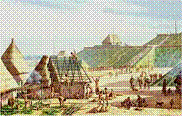
|
Limping Bear ruled
from his lands of Michigamea while Strong Heart took control of the warriors
in case of further incursions from the Hurons or Iroquois. The Chief of the Erie tribes was also
told to watch out for trouble from the east.
|
Elsewhere….
The Apache explore
out from their homelands to settle Opate and Ko’Aga. The Ute settle some of
their tribes in Unita while the Dakota tribes gain some influence in Iowa. The might Sioux
nation begins to stir..
South America
The Chimu Kingdom
of Chanchan
(Open Empire)
Acahuana, King of the Chimu
|
 
|
While Acahuana
ruled from Moche, his son and heir travelled to Wairajikira to gain a bride.
His proposal of marriage was met with great celebrations throughout the land-locked
province and Acahuana was granted an alliance with their chief. Thonapa’s
efforts in Cuzco
also saw dividends as they pledged to support the Chimu with their warriors.
The lands of the Huari became part of Acahuana’s kingdom when they threw off
their old ties.
|
The Mapuche
(Open Empire)
Raiel, Chief of the
Mapuche
|

|
Great excitement
spread throughout the southern lands as the monument neared completion after
many years of work. Colonists continued to trickle into Huilliche from Mapuche
as more and more of those lands were settled. Chief Raiel could do little
except oversee the colonists moving south. He found the time to father three
children during these years.
|
Chichen Itze
(Open Empire)
Hunac Teel, Chief of the Chichen Itze
|

|
The death of Hunac
Ceel in 1341 saw his son Hunac Teel take the Chichen throne after returning
from Yucatec with a new bride. Hunac Teel’s marriage and the efforts of the
Chichen nobility saw the antipathy towards Maya reduce considerably during these
years.
|
Zapotec Mitla
(Open Empire)
Oceloti, Chief of the
Zapotecs
|

|
As the lands of
Zapotec were further improved, the wilderness of Nahuatl was cut back and new
fields of corn planted. The sudden death of King Tepuz in 1341 saw his son Oceloti
take to the throne. His mother, Queen Alcatletec had been continuing her
negotiations with the Nahuatl when she heard the news of Tepuz’s death and
hurried back to Mitla to stand at her son’s side despite her sorrow; where he
continued to play an important part in court life. Toton was left to continue
in Nahuatl and concluded a successful understanding with the tribes of that
province.
|
The Carib
(Open Empire)
Hadali, Cacique of the
Carib, Son of Motega
|

|
The death of Motega
in 1341 came as a shock to his son Hadali as the news reached him during his
forays into Caquetto and Akawaio. These lands were virtually uninhabited and
yielded little in the way of gold or slaves for young Prince. On his return
to Sao-Cha Hadali was greeted as the new Cacique of the Carib peoples. Bala,
son of Paca, had been exploring the Cumangoto coast but could find little
sign of human inhabitation there.
|
The Triple Alliance
(Open Empire)
Huehueteotl, Chief of the Mexica
|

|
Huehueteotl oversaw
the building of Hulumanara on the Huasted coast. His attempts to persuade the
Tamaulipec tribes to join with the Alliance
proved difficult despite his offer of marriage to their Chief’s daughter.
|










































